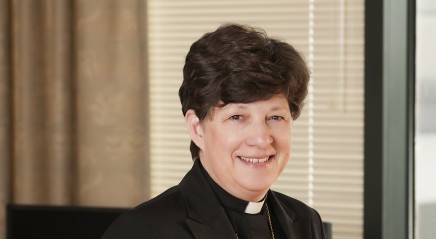Reformation is more than a historic moment, a time and space fixed around the drama of the 16th century that resulted in a deeper division in a corrupted church and a world torn apart by chaos. Reformation is more than a word under whose banner people gather to celebrate identity, purpose, mission. (And reformation happens equally in churches and denominations that identify as something other than Lutheran, too.) Reformation is more than having our heads turned from heaven to earth to find God’s presence and work, hidden and revealed.
Reformation is all these things. Yet, in the chaos of life—where, out of nowhere, guns blaze against the night sky, and lives are lost; where people fear and grow weary of senseless violence; where scenes of rows of caskets finding their place in fresh graves and clips of pastors trying to help people make sense of it all flash across our screens—Reformation is, in another sense, more than these things.
Reformation happens not only in the body’s neck, but also in its feet publicly walking into the world, not away from it. Reformation opens our eyes, waking us from delusion, showing us “what a thing actually is,” as Luther put it. Reformation opens the mouth, out of which the body cries in pain and protest, in despair and hope, instead of remaining silent, appearing to approve of the trauma unfolding. It stands with those whom others push into the margins and out of the country.
Reformation takes its hands out of its pockets and reaches out in the world. Reformation accompanies.
Reformation takes shoulders that signal resignation and forms them into steady presence—upon which, together, we carry the weight of the world because the world needs our shoulders, our hands, our feet, our voices, our lives.
Something that has its source in a love larger and deeper than our own, a mercy wider than we could conceive on our own, a forgiveness and reconciliation that flows through us in ways that surprise us.
Reformation is a movement in the church catholic, on the loose in the world God so loves, because of Christ’s death and resurrection for us and the Spirit’s reformatory power in and through us.
When we point to those whom we call reformers, we do so not because they are Lutheran, but because, through their ordinary lives, God’s grace has done something amazing. Something that has its source in a love larger and deeper than our own, a mercy wider than we could conceive on our own, a forgiveness and reconciliation that flows through us in ways that surprise us.
Reformation continues; it “flows on, in endless song,” the hymn “How Can I Keep From Singing?” proclaims. It finds us, who are “lost in wonder, love and praise,” the hymn “Love Divine, All Loves Excelling” declares.
Reformation invites us into the sweep of what God is doing in the world. Reformation opens our hearts and stirs our imaginations. Reformation shows us who we are. Reformation shows us who the world is.
Author and theologian Fredrick Buechner said, “Where your deep gladness and the world’s deep need intersect, that is your vocation.” Reformation draws the circle wider; not only your “deep gladness,” but also the fullness of who you are—all of it.






